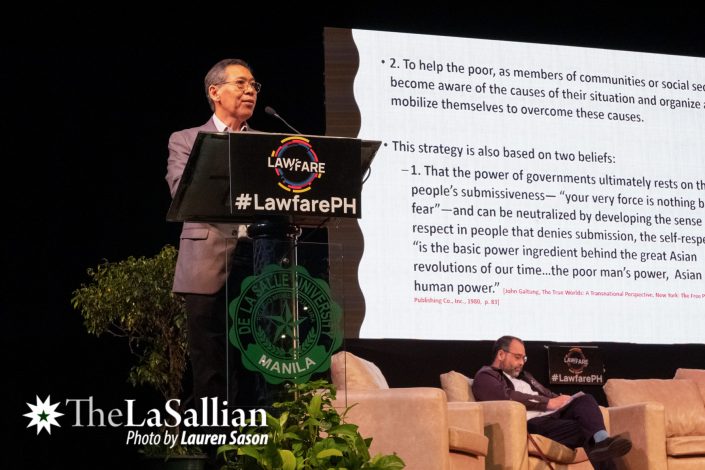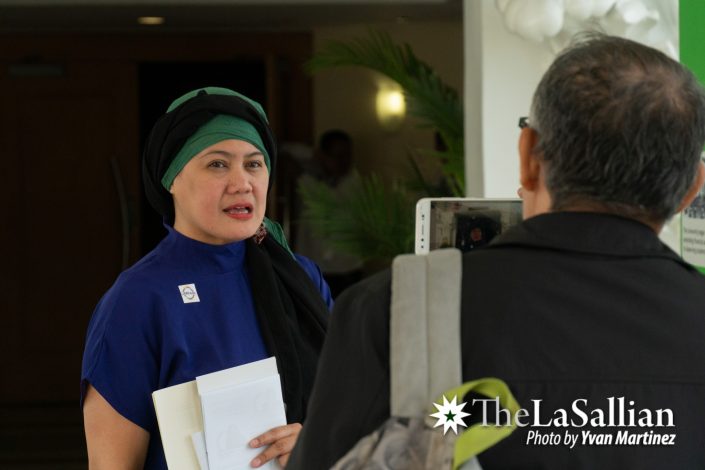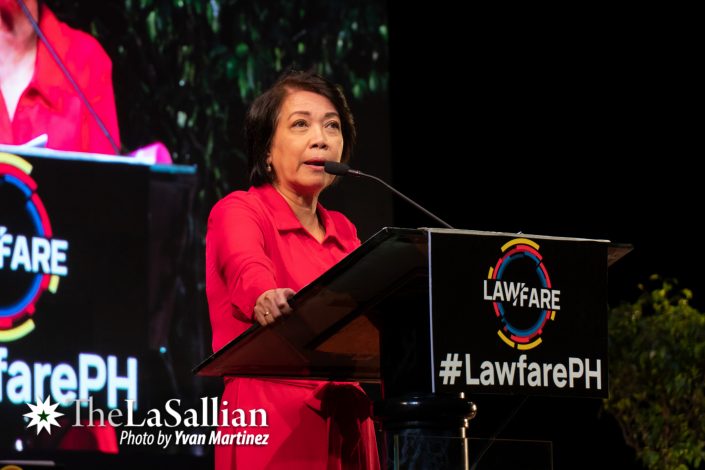In cooperation with the Alternative Law Groups, Human Rights and People Empowerment Center, and the Committee for the Freedom of Leila M. De Lima, DLSU hosted the International Forum on Lawfare: Weaponizing the Law Against Democratic Dissent at the Teresa Yuchengco Auditorium last February 21. A wide array of local and international political figures spoke in the forum, emphasizing the need to fight against the perversion of democratic rights in society.
Understanding Lawfare
The forum began with messages from the detained Sen. Leila De Lima, read out by her brother, Vicente De Lima II, and from Br. Armin Luistro FSC, Provincial Superior of the De La Salle Brothers of East Asia. Both emphasized the need to be strong in times of societal struggle and transgressions of human rights. “Friends, the Lord of justice is with us today; let us not lose heart. Comrades, it is time to put on the battle gear—today, we claim victory,” Luistro declared. De Lima lambasted the weaponization of the law “that victimizes human beings in many ways, in different levels”.
Former Chief Justice Maria Lourdes Sereno, who herself was ousted in 2018 through a quo warranto petition, emphasized how the law is being used maliciously to trample on democratic rights, hence the term “Lawfare”. She noted, “What is just might not be what the courts find as legal.”
Sen. Francis “Kiko” Pangilinan also argued that “mass murder has been proliferating because of the current system of justice”, stressing the need to “modernize our system”.

Under the barrel of weaponized law
In a short interim message, former Sen. Antonio Trillanes IV criticized the Duterte administration’s “wanton disregard of the rule of law”, adding that, “it is indeed lawfare in its ugliest, dirtiest and most brutal form.”
The second plenary session closed in on the stories of those who found themselves the targets of “Lawfare” under the Duterte administration. Atty. Chel Diokno explained how lawfare was used in decades before, under the guise of Martial Law. “The weaponization of the law in the Philippines began with [Former President Ferdinand] Marcos who destroyed judicial independence,” Diokno highlighted.
Hon. Mu Sochua, a former Member of Parliament of the Cambodia National Rescue Party, pointed out parallels in the human rights situation of Cambodia and the Philippines. “In Cambodia, the current government has closed all the borders, [has] taken away all the local and national seats of the opposition and minority parties, and threatens to pervert our human rights,” Sochua explained.
Commission of Human Rights Chairperson Jose Luis “Chito” Gascon asserted how the law’s purpose must center on creating “a proper space for people to interact freely with each other and as a tool for the protection of life and dignity.” A short video message was also delivered by Maria Ressa, Chief Executive Officer of Rappler, who was not able to attend the event. She similarly concluded that freedom in human rights and in the press must be one of the core tenants of a democracy. “We will not voluntarily give up any of the rights guaranteed by the constitution, the important thing here is to continuously point out that unthinkable actions are being taken by our government like the quo warranto case against ABS-CBN,” Ressa said.
Living with Lawfare
The third plenary session highlighted the stories of local and international leaders in their fight for freedom and subsequent entanglement with lawfare. Hon. Teodoro “Teddy” Brawner Baguilat Jr., former Ifugao Representative to the Association of Southeast Asian Nations Parliamentarians for Human Rights, emphasized looking past the “surface level” of the Duterte administration. “The current government is an authoritarian hiding behind a democratic facade, they use these systems to entrench themselves to do dictatorial acts,” he claimed.
Rafaela David, chairperson of Akbayan Youth, harped a similar message and doubled down on the importance of policies that need to be pro-people and pro-poor. “It is through international solidarity with our comrades that we can foster and discuss the progression of democracy,” she declared.
Corazon Juliano-Soliman, former secretary of the Department of Social Welfare and Development, accentuated that despite the looming threat to the country’s democracy and human rights system, the rule of law must lend itself to human rights and “legal acrobatics” cannot be tolerated.
Simultaneous break-out sessions were opened later during the day to highlight the effect of lawfare in different sectors. Topical focal points of these sessions covered Lawfare and Lawyering; Media; Political Opposition; Civil and Political Rights; Economic, Social, and Cultural Rights; Women, Youth and LGBTQ+; Labor, Urban Poor and Agriculture; and Religion. These were spearheaded by personalities, which included former Quezon Province Rep. Erin Tañada, Sen. Risa Hontiveros, and former Sen. Rene Saguisag.
Resistance
As the law increasingly becomes a tool to quell dissent, international law professor Richard Falk from Princeton University highlighted in a video message that awareness of how prevalent Lawfare is in society is critical. “Right now, we are seeing a trend in the progressive use of Lawfare, as it is usually used to exclude people of color, and allow widespread repression,” Falk said.
Similarly, Walden Bello, a sociology professor at the University of the Philippines Diliman, reiterated the importance of portrayal in understanding social issues, describing how a scathing depictions can be used to “shock moderates” and sour public opinion.
Former Environment Undersecretary Antonio La Viña, who is now serving with the Committee for the Freedom of Leila M. De Lima, delivered the final words, describing the conference as a “call for action”. He furthered, “The purpose for understanding is to how to fight and combat [lawfare] amongst its multiple fronts.”


